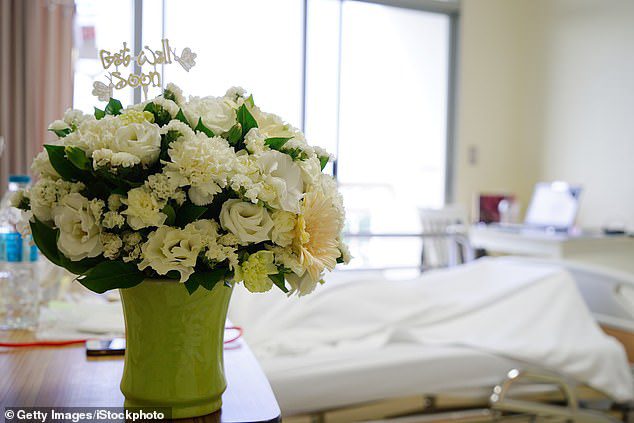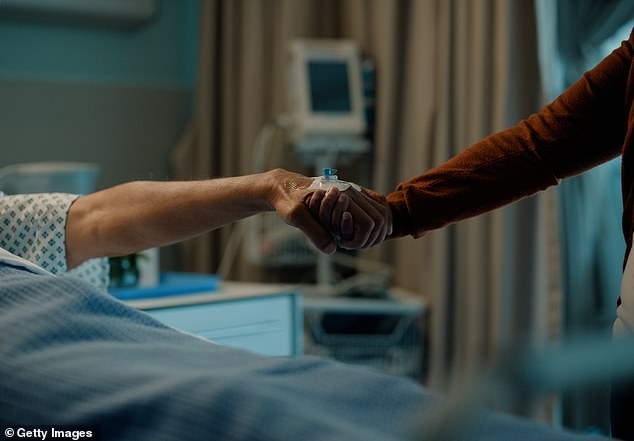What are you able to do to assist the one you love get properly and get out of the hospital sooner?
Making associates with the nurses? Giving the guide a bottle of alcohol? Making a fuss and complaining about every little thing?
Some or none of those options may match — although there's no assure that this can get the one you love dwelling sooner.
However from what I've seen in apply and based mostly on analysis, there’s one quite simple however efficient step that can make a distinction: mainly be there for them – go to them as a lot as attainable, take meals to them, assist them eat and drink, and be with them for so long as you might be allowed to.
As a part of my coaching as an A&E guide, I spent a 12 months caring for aged sufferers on a medical ward. One lady's reminiscence stands out clearly, as her husband was capable of do all of this for her. And when he couldn't do that on account of restricted visiting hours, it successfully killed her.

Go to the one you love as a lot as attainable, carry them meals, assist them eat and drink, and be with them so long as you might be allowed to.
This affected person was a tremendous lady – she had dementia however was so joyful, all the time singing and inspiring employees and different sufferers to sing too.
She was admitted in a state of confusion following a urinary an infection. Due to her weak point, we anticipated her to die inside just a few days. However for the primary few weeks, she remained miraculously properly. It was not due to something we medical doctors or nurses did, however due to what her husband did for her.
Day by day, he sat beside her, feeding and watering her. He introduced superbly ready, nutritious home-cooked meals – a stark distinction to the hospital-provided, extremely processed meals that sat on trays beneath her hospital mattress, untouched on account of a scarcity of employees to feed her.
After just a few days he requested if we may heat up the meals we had been giving him. After all we did, as a result of we knew the advantages of serving to him eat had been better than any danger of consuming meals that had no use-by date on it.
With their fixed care, her situation started to enhance. A lot in order that she started to get off the bed – they helped her to the bathroom after which, when she turned a little bit stronger, carried her to the bathroom.
When employees noticed how invaluable he was in her care, visiting restrictions had been lifted from 2pm to 8pm. This meant he may escort her to the bathroom earlier than mattress and provides her a goodnight kiss.
The day earlier than he was on account of be discharged, a brand new senior nurse got here to the ward who insisted he adhere to strict visiting instances. Sad, however too timid to argue, he left.
A couple of hours later he acquired a name. His spouse had tried to alleviate herself in the bathroom; the nurses requested him to attend a couple of minutes so they might take her away. However since they had been short-staffed, the wait lasted an hour.
She was determined and too proud to permit an accident to occur in her mattress, she tried to stroll away by herself. However she slipped and broke her hip. Though she had an operation the subsequent day, she by no means got here out of hospital and died three weeks later.
There was by no means a visitation time restriction on the dying certificates, however for my part it was definitely a big contributing issue.
I imagine try to be allowed to go to the one you love with out restriction (as much as a sure time at night time, clearly, as a result of they – and also you – have to sleep).

Professor Rob Galloway writes that if the affected person is joyful, and guests do not need an antagonistic impact on their care or different sufferers, then sufferers needs to be visited with out restriction when they’re awake.
However as we all know, exterior of A&E, maternity and kids's wards, the usual visiting hours in most hospitals are 2pm to 8pm; there are two causes behind this – firstly, to stop the unfold of an infection and secondly, as a result of ward rounds and nursing care rounds happen within the morning, and the thought is that visiting at the moment will delay medical doctors and nurses from doing their work.
However this logic is illogical, and plenty of hospitals are realizing this.
A latest change has been made by Leicestershire Partnership NHS Belief, which runs quite a few group hospitals. Final month it prolonged its visiting hours from 2pm to 8pm to 11am to 8pm.
Its govt director of nursing, Anne Scott, stated: 'We recognise the large profit visiting has to the well being, wellbeing and care of our sufferers and service-users.'
As a result of simply because that is the best way issues have all the time been achieved, doesn’t imply it’s proper or in the most effective curiosity of the affected person.
Quite the opposite, quite a few research have proven that being beneficiant with time for visiting family members improves affected person outcomes, reduces size of keep, and saves cash; it's a win-win for everybody.
How does it work? Having much less restrictive visitation instances reduces sufferers' stress ranges. A overview of research printed final 12 months within the journal PLOS One discovered that as sufferers' stress ranges decreased – which prolonged visitation instances performed a job in – their outcomes improved. This was the case each when it comes to how sufferers felt – a discount in signs equivalent to ache – and extra goal indicators, equivalent to size of hospital keep.
One other overview, printed within the journal Vital Care, discovered that unrestricted visits in intensive care considerably decreased size of keep – by at some point – in addition to a 60 per cent discount in delirium throughout all sufferers. Importantly, there was no enhance in infections.
Paying consideration — and consuming — can be necessary. Everyone knows the devastating impression of visitation restrictions throughout COVID, however a 2021 research within the Worldwide Journal of Nursing Research highlighted an necessary side. One of many unfavourable penalties for affected person well being was that many individuals not solely ate much less, but additionally did much less bodily work — like taking themselves to the lavatory.
This was along with psychological well being penalties together with depressive signs, anxiousness, and decreased cognitive capacity. The dietary features of this research had been regarding, and it is because usually guests assist their beloved one eat which prevents malnutrition.
Based on a report printed within the Journal of Human Diet and Dietetics in 2022, one-third of sufferers who enter the hospital with good diet can return to being malnourished. It’s usually the case that hospital employees go away meals out of attain of sufferers and do not need time to feed those that are unable to eat themselves, not to mention open their drinks and yogurt containers.
Lastly, there’s a robust argument for the presence of family throughout each ward and drugs rounds – when nurses give medicines to sufferers.
By being there they might help plan care by answering medical doctors' questions, and family' questions can be answered, lowering their anxiousness.
This may increasingly make ward rounds take a little bit longer, however the advantages far outweigh the additional time. As well as, family could be the ultimate examine on their family members to scale back medical errors – for instance, checking that they aren’t being given a medication they’re allergic to.
And having family round extra could make everybody step up their sport realizing they're being watched. A 2006 research printed within the journal An infection Management and Hospital Epidemiology confirmed that in 5 German intensive care models, if employees knew they had been being watched, their compliance with hand-washing guidelines elevated by 55 %.
Guidelines are guidelines, but when they don’t make sense, please problem them for the sake of your family members.
For my part, if the affected person is joyful, and guests do not need any antagonistic impact on their care or different sufferers, then sufferers ought to have unrestricted visitation whereas they’re awake.
I’ve seen the advantages. Per week in the past, my spouse gave start to our daughter; the care on the ward was wonderful, however I used to be additionally allowed full-time visits.
This was necessary to me, it took some strain off the employees and it additionally helped my spouse and our new child quite a bit.
However this facility needs to be commonplace for all sufferers in all wards.
Finally, it’s the one you love who’s within the hospital and, above all else, you’re the one who must advocate for them.
This fashion it is possible for you to to be there for them once they want you most.
@drrobgalloway


